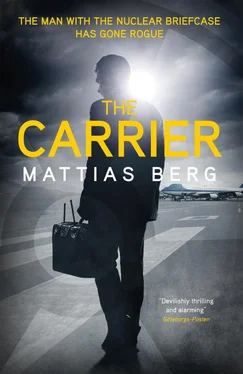Mattias Berg - The Carrier
Здесь есть возможность читать онлайн «Mattias Berg - The Carrier» весь текст электронной книги совершенно бесплатно (целиком полную версию без сокращений). В некоторых случаях можно слушать аудио, скачать через торрент в формате fb2 и присутствует краткое содержание. Город: London, Год выпуска: 2019, ISBN: 2019, Издательство: MacLehose Press, Жанр: Триллер, на английском языке. Описание произведения, (предисловие) а так же отзывы посетителей доступны на портале библиотеки ЛибКат.
- Название:The Carrier
- Автор:
- Издательство:MacLehose Press
- Жанр:
- Год:2019
- Город:London
- ISBN:978-0-85705-788-4
- Рейтинг книги:4 / 5. Голосов: 1
-
Избранное:Добавить в избранное
- Отзывы:
-
Ваша оценка:
- 80
- 1
- 2
- 3
- 4
- 5
The Carrier: краткое содержание, описание и аннотация
Предлагаем к чтению аннотацию, описание, краткое содержание или предисловие (зависит от того, что написал сам автор книги «The Carrier»). Если вы не нашли необходимую информацию о книге — напишите в комментариях, мы постараемся отыскать её.
The Carrier — читать онлайн бесплатно полную книгу (весь текст) целиком
Ниже представлен текст книги, разбитый по страницам. Система сохранения места последней прочитанной страницы, позволяет с удобством читать онлайн бесплатно книгу «The Carrier», без необходимости каждый раз заново искать на чём Вы остановились. Поставьте закладку, и сможете в любой момент перейти на страницу, на которой закончили чтение.
Интервал:
Закладка:
Because the entire nuclear weapons system was, behind the scenes, a patchwork of barely functioning connections, even nowadays controlled by floppy discs and other out-of-date technology, often without any backup whatsoever. Our heavily armed submarines were the worst example, something which was regularly raised by analysts and commentators as justification for their diametrically opposed opinions: an argument for comprehensive disarmament or for a much needed arms build-up.
These modern sea monsters, U.S.S. Rhode Island and our seventeen other “Ohio Class” atomic submarines invisible deep beneath the world’s oceans, now rarely rose to the surface. Each had the capacity to wipe out whole continents. But if we needed to communicate with them when they were cruising at depth in stealth mode, their stand-by position at times of high alert, it could take up to fifteen minutes to transmit three encrypted letters from sender to recipient, with the help of antennae at two eighteen-acre communications bases in Michigan and Wisconsin.
What is more, there was no technical possibility for the commander on board the submarine to acknowledge receipt, confirm whether he had understood the message correctly: whether for example he should surface—or fire off all his warheads.
These defects were used to justify the new communications solution. Certain training exercises in both the Arctic and the Antarctic had indicated that M.U.O.S. ought to be able to take care of these problems, using the new system’s spectacular ability to establish contact with areas which had previously been unreachable. Not only beneath the world’s oceans, but also below the pack ice at both poles, which in itself would permit a new colonization of these regions.
Yet as usual they were missing the crucial point. Certainly, M.U.O.S. would replace G.P.S., give rise to new communications possibilities, dramatically greater operational capacity. But the inner meaning of the system was, according to Edelweiss, something more important.
Everything is very obvious once you know. How perfectly this system fitted into our nuclear build-up, the “Revitalization”. Edelweiss had compared it to our superior night-combat technology, developed in time for the first Iraq war. He said that M.U.O.S. would be the same sort of game-changer. Allow us to exploit the advantages of the coming generation of nuclear weapons, synchronizing all these minor miracles with each other, justifying the trillion-dollar investment. The radar-guided B.61-12 hydrogen bomb. Our new generation of nuclear weapons submarines, with a dramatically improved striking power and precision. Missiles with previously unthinkable levels of performance.
So here we were. At the place for the fulfilment of this worldwide system, in a godforsaken town next to our last M.U.O.S. base: the missing link. Marching up the steep streets with the groceries and our luggage filled with Doomsday potential—and the graffiti along the way like whispering reproaches, pointing fingers, an almost audible murmur.
At a deserted square, in what seemed to be the town’s outer edge up on the mountain ridge, Ingrid led me off on a small path to the right of a baroque church. In the shelter of a pine tree she took out her torch and shone it onto the laminated map which somebody had mounted on a gatepost: a calculation of how far the radiofrequency radiation from the system’s mighty antennae would extend. The red area covered most of Sicily.
This was one branch of the opinion ranged against the installations. When the army doctor at the M.U.O.S. base died of leukemia, a fact which only emerged because activists and the local media began informally to exchange information, the protests against the health risks of the system began to attract support from international doctors’ associations and humanitarian groups. Mothers of soldiers serving at the base soon joined forces with them.
The other branch of the protests was opposition to war in general—not least this type of military communications system, which more effectively facilitated warfare. Which in turn created a link between the protests here in Niscemi and the worldwide peace movement.
So Ingrid would presumably wait for just the sort of massive uproar which the graffiti promised, the moment itself: a revolt as big as a blue whale. She would synchronize our move with the inauguration of the last M.U.O.S. base, just as with the protests at Kleine Brogel. When everybody was paying maximum attention in the wrong direction.
The problem was that none of us in the Team, not even our own Alpha, had been able to find out precisely when the formal opening was to take place. The date had been shrouded in impenetrable secrecy for several years. Maybe there was nobody who knew yet. Maybe even the person responsible, whether it was Edelweiss or the President himself, was waiting for a purely random date. Simply improvising. To keep the anarchists at bay.
After several minutes immobile in front of the map, no doubt reflecting on the scale of the radiation’s red zone, Ingrid hurried us on again. Led the way up into what was to become our rudimentary safe house.
Instinctively I mapped out escape paths, red and green zones. Not one strip of light seeped out through the building complex’s drawn blinds, even though it was no later than half past nine. The dirty yellow facade was full of cracks, covered in graffiti. Only one set of entrance stairs had functioning lights—and it was not ours. Once inside the stairwell, Ingrid dared to light her torch again, since all of the doors on the landings seemed to be closed.
And even if one door were to be opened, against all the odds, it would hardly make any difference. These were places where you did not ask questions. Where neighbors would at best stare silently at strangers like us—soldiers, plainclothes policemen, American agents?—from their darkened hallways.
Up in the corner apartment itself, everything was very much to type. The first stifling smell of mold, two mattresses nibbled by bugs, or possibly mice, lying directly on the floor in the one large room, an open kitchen which in true Mediterranean style had been half moved out when the entire process must have been interrupted. Oven and refrigerator were functioning, even if the latter was buzzing like an engine on the point of breakdown, while one half of the sink had simply been removed. An ancient black-and-white T.V. stood next to the mattresses on the floor—with another on top of it. One with a functioning image, one with sound.
In short, here was the bare minimum needed for an assignment. Walls and ceiling, remote location, views in three directions.
That view through the broken windows made me catch my breath. The barely distinguishable contours of the mountains against the black of the sky, single lights along winding streets leading down to the sea, the stars blinking like coded messages to us, the long path of the moon across the water. The world over which the final battle was soon to be fought. The only one we had.
Again I considered whether to escape, run hard in one single burst to the sea, travel north to the eternal ice and the rendezvous with my conscience—but I did nothing. Perhaps because I wanted to see how everything would play out. Perhaps because I could still prevent something from happening, play a part.
Ingrid put the turkey in the refrigerator and turned on the T.V., the volume low.
C.N.N. was reporting ninety-seven confirmed deaths and about the same number again of serious injuries from the explosion at Dulles, which according to the commission of enquiry had been caused by a leak in the airport’s fuel storage facility. Heads had begun to roll among those responsible. Two of the most senior members of staff had been forced to resign. An expert in the studio was saying that the head of the airport itself could not remain in his job much longer.
Читать дальшеИнтервал:
Закладка:
Похожие книги на «The Carrier»
Представляем Вашему вниманию похожие книги на «The Carrier» списком для выбора. Мы отобрали схожую по названию и смыслу литературу в надежде предоставить читателям больше вариантов отыскать новые, интересные, ещё непрочитанные произведения.
Обсуждение, отзывы о книге «The Carrier» и просто собственные мнения читателей. Оставьте ваши комментарии, напишите, что Вы думаете о произведении, его смысле или главных героях. Укажите что конкретно понравилось, а что нет, и почему Вы так считаете.












